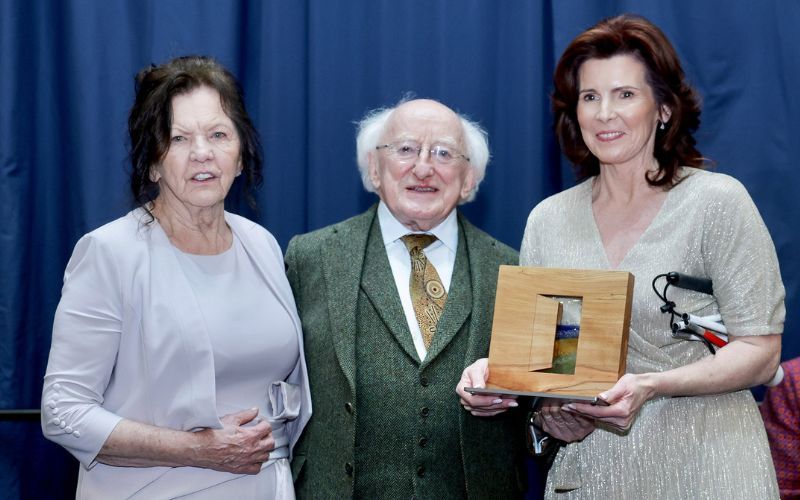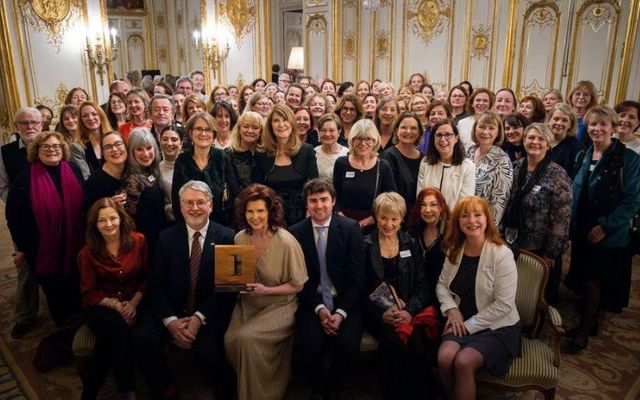Last week, at a reception in her honor at the Irish Embassy in Paris, blind Irish singer Maria Doyle remembered how back in 2017, “I barely got through the Embassy door and felt like a stowaway!”
The invitation she had been promised for a 2017 Bloomsday event at the Embassy hadn’t materialized. However that didn’t deter Maria, and she set out from her small village in Lorraine before another invitation, from an alternative source, Declan Mc Cavana MBE, a man she had never met, arrived by email.
At the Embassy, she courageously and unorthodoxly distributed flyers about her forthcoming autobiography and located, by his booming voice, Mc Cavana, who had read from "Ulysses" earlier that evening. She told him she wanted to sing, and despite Embassy protocol, he let her have her chance. When she sang "Danny Boy," there wasn’t a dry eye in the house.
Last week, a biblical seven years later, so much has changed in Maria’s life. However, two things remain constant; when she sang (accompanied on piano by her son Emmanuel), "Memory" by Barbra Streisand, "You Raise Me Up" by Brendan Graham, and "Danny Boy," there again wasn’t a dry eye in the house.
Moreover, Mc Cavana was there to read again, this time not from "Ulysses," but from Maria’s autobiography!
Proud to be Irish ☘️ Posted by Maria Doyle on Saturday, October 7, 2023
Maria spoke about her birth in a Magdalene laundry and how her maternal grandmother Isabel rescued baby Maria and her mother Eileen from the dreaded institution.
When she was five years old, she won her first singing competition in Fagin’s Pub, Castletown Road, Dundalk. She will never forget how she felt when the pub owner announced the winner. She felt like a star.
Her fascination with the stars started as a child, the more she gazed at them, the more she felt “someone up there had a plan for her.” She feels “the stars have always watched over and guided me.”
At nine, Maria was struck blind which seemed to foreclose her dream of becoming a singing star. She was sent to a school for blind children in Dublin and was told: “The most you can aspire to in life is to becoming a telephone operator.”
However, young, feisty Maria refused to live down to others’ expectations and ran away from the school, negotiating her 50-mile way home to Dundalk.
She embarked on an early singing career with a tour of Irish America as a 13-year-old singing sensation. At 19, she represented Ireland, under the stage name Maria Christian, in the Eurovision winning sixth place with Brendan Graham’s song "Wait Until the Weekend Comes," while, remarkably, hiding her disability. When people noticed anything, she’d use vanity as an excuse saying “I just refuse to wear jam jar glasses.”
She met her French husband Emmanuel Cuche in Ireland and they moved to France in 1992 when she was pregnant. After dedicating her life to raising their seven children, instilling in them her love of music, Maria returned to the public eye when, after her 2017 TED Talk, Plon, a major French publisher, published her heartfelt autobiography in French “On ne voit bien qu’avec le cœur” ("One Can Only Truly See with the Heart") in 2018.
In 2020, accompanied by five of her children, she sang in the semi-finals of The Voice France, the high point of an extraordinary second act, one in which, far from hiding her blindness, she embraced her status as a role model and an advocate for people with disabilities.
Maria has used her extraordinary voice to give voice to others. She became the first Irish woman to sing in the Panthéon in Paris when in 2022 she sang at the 70th anniversary of the pantheonisation of Louis Braille and today acts as an ambassador for Voir Ensemble, an association for the blind.
A disability activist, and an advocate for women’s rights, she is an extraordinary voice in more ways than one and a star in every way.
It was only after her triumphant evening that Maria remembered that Avenue Foch, where the Embassy is located, radiates from the Arc de Triumph which sits in a circular plaza, Place de l’Etoile, from which 12 majestic avenues form a star (étoile), which is why the monument is also called “the Arch of Triumph of the Star.”
It seems by being the first Irish woman in France to win a Presidential Distinguished Service Award (PDSA), Maria’s destiny had once again aligned with the stars, the scintillating location of the event underlining her triumph.
Reminiscing on the recent January 16 PDSA award ceremony in Dublin, she said her recognition was rendered even sweeter when “My mother, a Magdalene laundry survivor – who refused to give me up at birth – guided me up the steps in Áras an Uachtaráin, and shook the hand of President M.D. Higgins.”

President of Ireland Michael D. Higgins presents the 2023 Distinguished Service Award to Maria Doyle (far right). Maria's mother Eileen Doyle on far left.
Last week, in the Irish embassy in Paris, instead of a lone “stowaway,” Maria was a homecoming queen, surrounded by Mná na hEireann, a community group for Irish women in France. Like many others born in a Magdalene Laundry, Maria yearns to meet her biological father (Spaniard Théodore Gonzalez) and hopes that the day her Spanish family discovers her existence is also written in the stars.
Maria is fiercely proud of her Irishness, and His Excellency, Niall Burgess, Ambassador of Ireland to France, pointed out: “Maria Doyle represents those Irish women who refused to live within imposed boundaries.”
She enhances the Irish community in France where she is a household name and I am very much looking forward to her life story being published in English, allowing her message of resilience, justice, and love to shine worldwide.
Curiously, when you think back to 2017, when Maria Doyle barely made it through the Paris Embassy door, her PDSA, a magnificent work of art designed by Spear Product Design, is based on the concept of an open door, which leads to the landscape of Ireland, capturing the welcoming nature of both the Irish people and Ireland as a nation.
You can listen to Maria Doyle’s own voice here online in an interview direct from the Irish Embassy in Paris.
This article was submitted to the IrishCentral contributors network by a member of the global Irish community. To become an IrishCentral contributor click here.




Comments